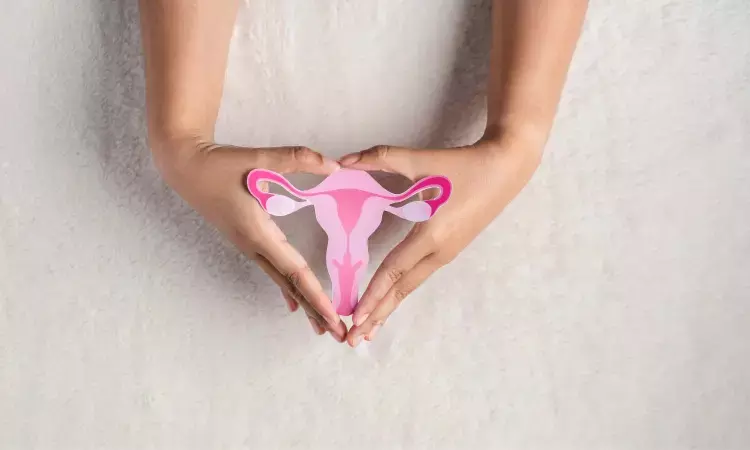- Home
- Medical news & Guidelines
- Anesthesiology
- Cardiology and CTVS
- Critical Care
- Dentistry
- Dermatology
- Diabetes and Endocrinology
- ENT
- Gastroenterology
- Medicine
- Nephrology
- Neurology
- Obstretics-Gynaecology
- Oncology
- Ophthalmology
- Orthopaedics
- Pediatrics-Neonatology
- Psychiatry
- Pulmonology
- Radiology
- Surgery
- Urology
- Laboratory Medicine
- Diet
- Nursing
- Paramedical
- Physiotherapy
- Health news
- Fact Check
- Bone Health Fact Check
- Brain Health Fact Check
- Cancer Related Fact Check
- Child Care Fact Check
- Dental and oral health fact check
- Diabetes and metabolic health fact check
- Diet and Nutrition Fact Check
- Eye and ENT Care Fact Check
- Fitness fact check
- Gut health fact check
- Heart health fact check
- Kidney health fact check
- Medical education fact check
- Men's health fact check
- Respiratory fact check
- Skin and hair care fact check
- Vaccine and Immunization fact check
- Women's health fact check
- AYUSH
- State News
- Andaman and Nicobar Islands
- Andhra Pradesh
- Arunachal Pradesh
- Assam
- Bihar
- Chandigarh
- Chattisgarh
- Dadra and Nagar Haveli
- Daman and Diu
- Delhi
- Goa
- Gujarat
- Haryana
- Himachal Pradesh
- Jammu & Kashmir
- Jharkhand
- Karnataka
- Kerala
- Ladakh
- Lakshadweep
- Madhya Pradesh
- Maharashtra
- Manipur
- Meghalaya
- Mizoram
- Nagaland
- Odisha
- Puducherry
- Punjab
- Rajasthan
- Sikkim
- Tamil Nadu
- Telangana
- Tripura
- Uttar Pradesh
- Uttrakhand
- West Bengal
- Medical Education
- Industry
Vaginal Estrogen may effectively lower recurrent UTIs in Hypoestrogenic Women

When vaginal estrogen was provided to hypoestrogenic women to avoid recurrent urinary tract infections, the frequency of UTIs fell by more than 50% over the following year supporting the fact that vaginal estrogen is effective in reducing urinary tract infections.
The study results were presented at the 2022 scientific meeting of the American Urogynecologic Society and the International Urogynecological Association, Austin, TX, and published in the American Journal of Obstetrics & Gynecology on May 11, 2023.
Urinary tract infections (UTIs) are substantial health problems among females and a considerable burden to the healthcare facility. Many women suffer from breakthrough infections despite being on antibiotics. Presently vaginal estrogen is considered the standard of care to prevent recurrent UTIs among women with hypoestrogenism to avoid multidrug resistance due to antibiotics. As there are only smaller trials that studied the efficacy of vaginal estrogen in hypoestrogenic women, researchers from Kaiser Permanente, San Diego, California conducted a study to assess the association between vaginal estrogen prescription and the frequency of urinary tract infections over the following year in a diverse population of women with hypoestrogenism.
A multicenter retrospective review was carried out by including women who were prescribed vaginal estrogen for the indication of recurrent urinary tract infection from January 2009 through December 2019. Patients were asked to fill their prescriptions and continue care within Kaiser Permanente Southern California system for at least one year. Exclusion criteria included anatomic abnormalities, malignancy, or mesh erosion of the genitourinary tract.
Recurrent urinary tract infection was defined as having ≥3 positive urine cultures (separated by at least 14 days) in the 12 months preceding the index vaginal estrogen prescription.
Adherence was captured through refill data after the index prescription. Low adherence was defined as no refills; moderate adherence was defined as one refill; high adherence was defined as ≥2 refills.
Data were abstracted from the electronic medical record system using the pharmacy database and diagnosis codes. Pre- and post-prescription urinary tract infections over the year preceding and following the vaginal estrogen prescription were compared using paired t-tests. Predictors of post-prescription urinary tract infection were evaluated by multivariate negative binomial regression.
What did the study Find?
- Cohort details are as follows:
| No. of participants (n) | 5638 women |
| Mean (±standard deviation) age | 70.4 (±11.9) years |
body mass index | 28.5 (±6.3) kg/m2 |
baseline urinary tract infection frequency | 3.9 (±1.3) |
| Race | White (59.9%) or Hispanic (29.7%) |
postmenopausal | 93.4% |
- The mean urinary tract infection frequency was reduced by 51.9% after the index prescription (from 3.9 to 1.8).
- During the index prescription, 55.3% of patients experienced ≤1 UTIs and 31.4% experienced none.
- Significant predictors of the post-prescription urinary tract infection included age (75 to 84 years), increased baseline urinary tract infection frequency, urinary incontinence, urinary retention, diabetes mellitus, and moderate or high medication adherence.
- Patients with high medication adherence demonstrated more frequent post-prescription urinary tract infections than patients with low adherence.
The present study has reiterated the fact that vaginal estrogen is effective in reducing UTIs in hypoestrogenic women,
Further reading: Efficacy of vaginal estrogen for recurrent urinary tract infection prevention in hypoestrogenic women. https://doi.org/10.1016/j.ajog.2023.05.002
BDS, MDS
Dr.Niharika Harsha B (BDS,MDS) completed her BDS from Govt Dental College, Hyderabad and MDS from Dr.NTR University of health sciences(Now Kaloji Rao University). She has 4 years of private dental practice and worked for 2 years as Consultant Oral Radiologist at a Dental Imaging Centre in Hyderabad. She worked as Research Assistant and scientific writer in the development of Oral Anti cancer screening device with her seniors. She has a deep intriguing wish in writing highly engaging, captivating and informative medical content for a wider audience. She can be contacted at editorial@medicaldialogues.in.
Dr Kamal Kant Kohli-MBBS, DTCD- a chest specialist with more than 30 years of practice and a flair for writing clinical articles, Dr Kamal Kant Kohli joined Medical Dialogues as a Chief Editor of Medical News. Besides writing articles, as an editor, he proofreads and verifies all the medical content published on Medical Dialogues including those coming from journals, studies,medical conferences,guidelines etc. Email: drkohli@medicaldialogues.in. Contact no. 011-43720751


